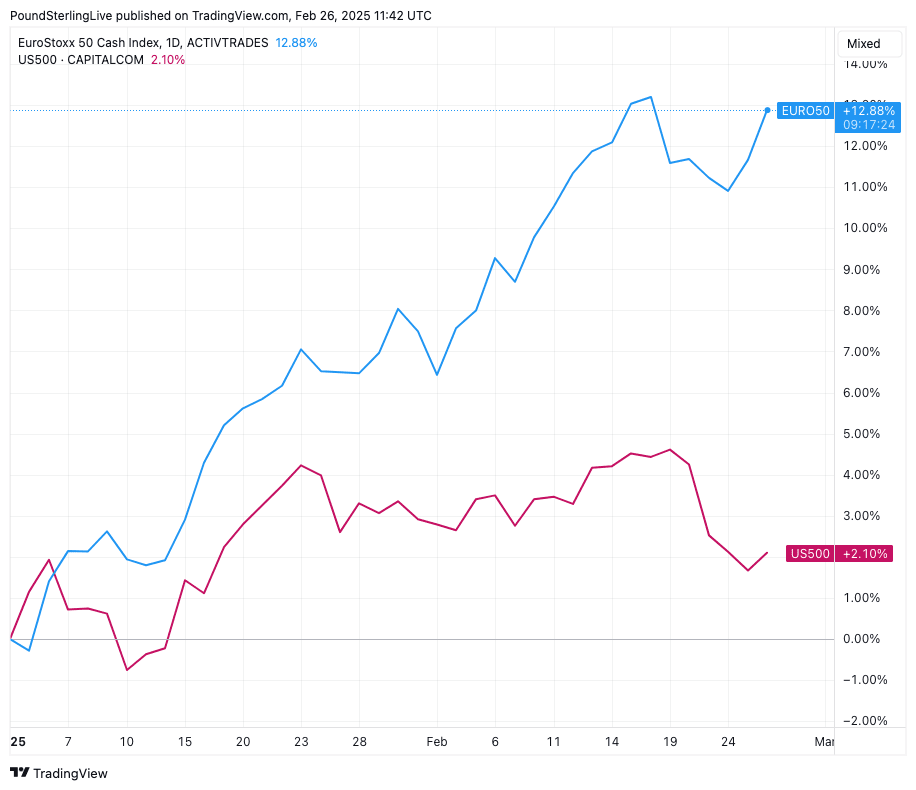BlackRock Upgrades Europe
- Written by: Gary Howes
-

Image © Adobe Images
BlackRock has upgraded its stance on European equities, closing its underweight position and moving to a neutral stance, citing improving sentiment and potential catalysts that could drive valuations higher.
The world's largest asset manager still maintains an overweight position on U.S. stocks but acknowledges that Europe has started 2025 with stronger gains.
European equities have outperformed U.S. stocks year-to-date, with the Stoxx 600 index rising nearly 9%, compared to the S&P 500’s 3% gain.
BlackRock analysts point to easing energy costs, potential fiscal stimulus in Germany, and the possibility of de-escalation in the Ukraine war as factors that could further support European stock markets.
"With a lot of bad news already priced in, even small positive developments could help push European equities higher," says Jean Boivin, Head of BlackRock Investment Institute.
Above: Eurostoxx 50 outperforms the S&P 500.
The firm also highlighted that higher defence spending and room for more European Central Bank rate cuts could provide additional tailwinds for the region’s stocks.
Despite the improved outlook for Europe, BlackRock remains cautious about long-term structural challenges, including competitiveness concerns and potential U.S. tariffs on European goods.
The firm continues to see the U.S. market as a leader, driven by strong corporate earnings and the ongoing AI boom.
BlackRock upgraded its stance on European equities from underweight to neutral for the following reasons:
- Strong Performance to Start 2025 – European equities have outperformed U.S. stocks year-to-date, with the Stoxx 600 up nearly 9% compared to the S&P 500’s 3% gain.
- Improving Sentiment – A lot of negative news is already priced in, meaning even small positive developments could push European equities higher.
- Potential De-escalation in the Ukraine War – A peace agreement or reduced tensions could lead to lower energy prices, supporting economic growth and easing inflation.
- Easing Energy Costs – Europe has already reduced its reliance on Russian gas, and further declines in energy prices would boost corporate profitability and consumer spending.
- Expected Fiscal Loosening in Germany – The recent German election results could pave the way for increased government spending, providing a stimulus effect for European markets.
- Higher Defense Spending – The U.S. signalling that Europe must take more responsibility for its own defence could lead to greater military expenditures, benefiting key European industries.
European Central Bank (ECB) Rate Cuts – Sluggish euro area growth and easing inflation may allow the ECB to cut interest rates further, supporting equities.
Attractive Valuations – European stocks are trading at a significant discount compared to U.S. equities, making them an attractive investment if economic conditions improve.
In its broader allocation strategy, BlackRock is further reducing exposure to long-term U.S. Treasuries, citing persistent deficits and geopolitical fragmentation as factors that could drive yields higher. It continues to prefer short- and medium-term maturities in fixed income while favouring European credit over U.S. corporate bonds.
BlackRock's shift in stance on European equities comes as global markets adjust to evolving monetary policies and geopolitical risks. The firm sees a narrowing performance gap between U.S. and European stocks but remains convinced that the U.S. will continue to hold its competitive edge.
While risks remain, including U.S. tariff policies and sluggish euro-area growth, BlackRock’s decision to move from underweight to neutral reflects growing confidence that European equities could offer upside potential in 2025.





